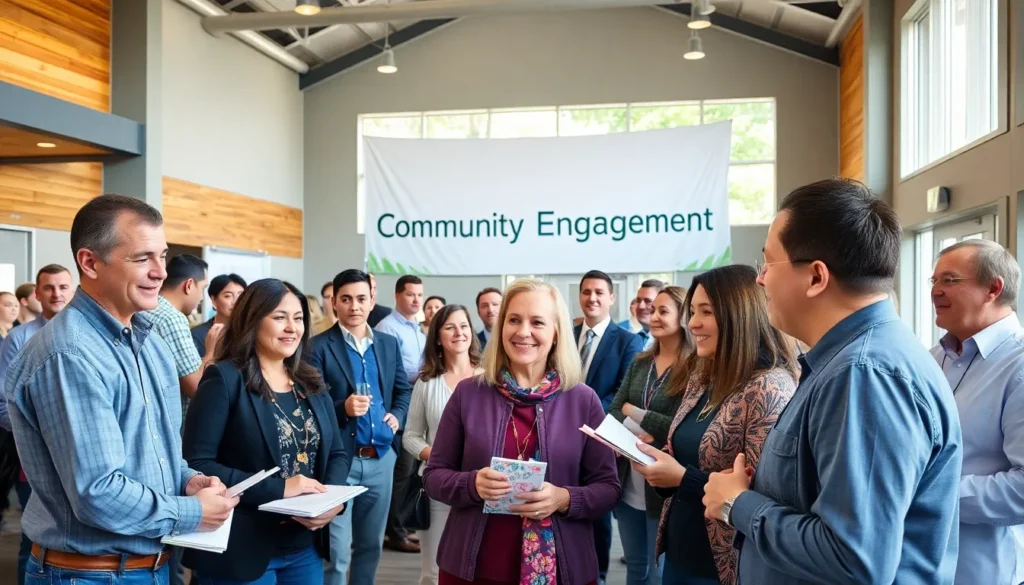In the fast-paced world of technology, staying current is crucial. ChatGPT burst onto the scene, impressing users with its conversational prowess and knowledge. But as time marches on, one question looms larger than a cat meme on the internet: Is ChatGPT still stuck in 2021?
Table of Contents
ToggleOverview of ChatGPT Development
ChatGPT’s development began with the release of its initial model in June 2020. Researchers aimed to enhance conversational AI capabilities through various iterations. The introduction of GPT-3 in 2020 marked a significant milestone, utilizing over 175 billion parameters to understand context and generate human-like responses.
Upgrades continued beyond initial releases, with frequent updates focused on improving performance and reducing biases. In March 2021, ChatGPT showcased enhanced conversational skills, but access to real-time information remained a limitation.
OpenAI, the organization behind ChatGPT, focused on training its models on diverse datasets, cementing the goal of providing accurate and context-aware responses. They implemented safety measures to handle sensitive topics and improve the overall user experience.
Newer versions of ChatGPT, including the highly anticipated GPT-4, aim to expand the model’s knowledge, potentially breaking away from the 2021 data constraint. Innovation remains a key component, with ongoing research into integrating current events and live data feeds.
ChatGPT’s development timeline illustrates a commitment to advancement, yet carries the understanding that the nature of AI is continuously evolving. Enhancing conversational abilities remains a primary focus, paired with addressing the limitations encountered in earlier versions.
These developments show a drive toward creating a more robust AI, but users may still encounter responses rooted in pre-2021 knowledge. The trajectory of ChatGPT suggests an ongoing effort to bridge gaps and improve relevance in its interactions with users.
Limitations of ChatGPT’s Knowledge Base

ChatGPT’s knowledge base has limitations tied to its training data, primarily capped at 2021. Users must recognize that any newer information or events occurring after that year won’t be included in its responses.
Understanding the 2021 Cutoff
The cutoff in 2021 marks a clear boundary for the data ChatGPT utilizes. This limit stems from the last training session conducted by OpenAI, during which all input was collected from various sources available before this point. Insights that emerged after this date are beyond its reach. Consequently, developments in technology, culture, and science since then remain unaddressed. Knowledge from news, significant events, and societal shifts reflects that constraint. Current trends aren’t represented in ChatGPT’s learned data, leading to potential gaps in conversation relevance.
Implications for Users
Users interacting with ChatGPT encounter specific implications from its knowledge limitation. It’s essential to approach responses with the understanding that information may be outdated. Questions about recent topics may yield irrelevant or incomplete answers, as the model utilizes pre-2021 knowledge. This disconnect can impact decision-making by providing users with obsolete references regarding current affairs. Furthermore, ongoing events may be misconstrued or entirely absent. Users must supplement interactions with recent data to ensure accuracy and relevance.
Recent Updates and Enhancements
Recent advancements with ChatGPT have improved its capabilities significantly. Innovations in AI have taken center stage, leading to enhancements that refine its conversational abilities. For instance, models now incorporate broader data sources, which enable richer context and more nuanced understanding. Improvements target natural language processing, making interactions smoother and more human-like. Developers continue to prioritize reducing biases, ensuring users receive more accurate responses. With the introduction of advanced algorithms, users find ChatGPT more reliable for generating relevant content.
Ongoing learning mechanisms also play a crucial role in updates. Adaptive learning components allow ChatGPT to adjust its responses based on user interactions. This feature helps the model learn user preferences, enhancing personalization. OpenAI implements user feedback loops, which continually refine the model’s performance. These mechanisms ensure that while the training data remains capped at 2021, user interactions influence its future responses. Ultimately, these updates contribute to a more engaging experience for users seeking information and assistance.
Perspectives on ChatGPT’s Relevance
The ongoing evolution of ChatGPT raises important questions about its current relevance. Understanding how it compares to other AI models and addressing user feedback offer valuable insights.
Comparison with Other AI Models
ChatGPT stands out due to its ability to generate human-like text using over 175 billion parameters. This extensive capacity enables it to deliver detailed responses across various topics. In contrast, other AI models may rely on less extensive datasets or different architectures, which can limit their conversational quality. Despite its strengths, challenges persist, such as staying current with information. Other models may employ real-time updates, offering advantages in delivering the latest data. Organizations continually enhance their models, which pushes the competitive landscape forward. Ultimately, comparing ChatGPT with its peers illustrates the unique nuances of AI technology.
User Experiences and Feedback
Users frequently remark on ChatGPT’s conversational abilities, often praising its fluency and coherence. Many have shared experiences about its effectiveness in providing relevant assistance. However, some users express concerns regarding outdated information, given the 2021 knowledge cutoff. Feedback often highlights the importance of using ChatGPT as a starting point rather than a sole resource. Users emphasize the need to verify critical information with up-to-date sources. Continuous improvements arise from this feedback loop, as OpenAI actively works to enhance user experience. With evolving interactions, user insights shape the future development of ChatGPT.
ChatGPT remains a powerful tool for generating conversational responses despite its knowledge being limited to data up to 2021. Users should approach it with an understanding of its constraints and recognize the importance of seeking additional information for the most current topics. Ongoing advancements in AI technology promise to enhance its capabilities, making future versions even more relevant. Feedback from users will continue to play a vital role in shaping its development, ensuring that it evolves alongside the rapidly changing landscape of information. For now, ChatGPT serves as an excellent starting point for inquiries but should be complemented with up-to-date resources for comprehensive understanding.









